#louise desalvo
Text

Louise DeSalvo, about Djuna Barnes
#like initiation...#companions of the flame#the gift#*lit#Louise DeSalvo#Djuna Barnes#so that i might hear the unsaid more clearly
45 notes
·
View notes
Quote
My admiration for Virginia Woolf has increased, and I am more than ever saddened by the example of her death. And I am affected by the other lives DeSalvo shows with such sensitivity: the silent ones, powerless to help, sitting with their sponges at the far end of the tub. Less gifted, less overtly self-destructive women than their brilliant relative, they yet found the old female ways of keeping themselves from living life. Shutting down behind self-pity and secret shame; sacrificing themselves to childish mothers and selfish men; vaguely yearning, self-medicating; painting someone else's pictures; obediently tracing the magic circle, afraid, entranced. There are so many different ways to drown.
Kennedy Fraser
#THERE ARE SO MANY DIFFERENT WAYS TO DROWN#this essay is one of the best essays i've ever read#and i am about to be insufferable#bc i will NOT stop talking about it#book recs by em#virginia woolf#louise desalvo#kennedy fraser
19 notes
·
View notes
Text
[W]hat if we thought, not of each individual work but focused, instead, on our writing life as a continuum, with the completion of each project viewed as another important step in a lifetime of practice?
Louise DeSalvo (The Art of Slow Writing)
2 notes
·
View notes
Text
tagged by @uraniumdaydreams , thanks!
last song: forget about ~ sibylle baier
last movie: northman
currently watching: scream (2016 mtv series)
currently reading: writing as a way of healing by louise desalvo
currently craving: spicy korean fried chicken & a cherry vanilla coke
last thing I researched: the ohio special election (specifically issue 1)
tag 9: nuh uh. I’ll tag @jortking and @the-infinite-mediocrity bc i know they do tag stuff, anyone else cn do it too
9 notes
·
View notes
Text
Such were the figures that seemed unnaturally brought together in the great whirlpool; and it did not need the eye of a seer to foretell collision, fracture, and at length a sundering of the parts. Where are we today, indeed, who used to stand so close?
—Virginia Woolf, “Reminiscences,” Moments of Being: Unpublished Autobiographical Writings
Drowning metaphors are frequently used by incest victims. Woolf wrote of being left an orphan “in a sea of halfbrothers”; of being “drowned in kisses”; of feeling, around George, like “an unfortunate minnow shut up in the same tank with an unwieldy and turbulent whale.” In one of the most important extant works that we have from her adolescence, which I discuss in a subsequent chapter, she describes nearly drowning in a pond covered with duckweed and she signed her work, “One of the Drowned.”
—Louise DeSalvo, Virginia Woolf: The Impact of Childhood Sexual Abuse on Her Life and Work
10 notes
·
View notes
Text










Connor Roy: The Laborious Pain of Family and Acceptance of Himself
Masterlist
Non Succ References Only
Violence and the Sacred by René Girard/Faulkner's Families: A Southern Saga by Gwendolyn Chabrier/Healing the Incest Wound 2e: Adult Survivors In Therapy by Christine A Courtois/Secret Survivors: Uncovering Incest and Its Aftereffects in Women by E. Sue Blume/Violence and the Sacred by René Girard/Healing the Incest Wound 2e: Adult Survivors In Therapy by Christine A Courtois/Lady in Spain Ingrid Michaelson/Healing the Incest Wound 2e: Adult Survivors In Therapy by Christine A Courtois/Anti Hero by Taylor Swift/First Memory by Louise Glück/ First Memory by Louise Glück/First Memory by Louise Glück/Virginia Woolf: The Impact of Childhood Sexual Abuse on Her Life and Work by Louise DeSalvo/ Virginia Woolf: The Impact of Childhood Sexual Abuse on Her Life and Work by Louise DeSalvo/ Virginia Woolf: The Impact of Childhood Sexual Abuse on Her Life and Work by Louise DeSalvo/Dawsons Creek 5.10/Today Has Been OK by Emilíana Torrini and The Colorist Orchestra
16 notes
·
View notes
Text
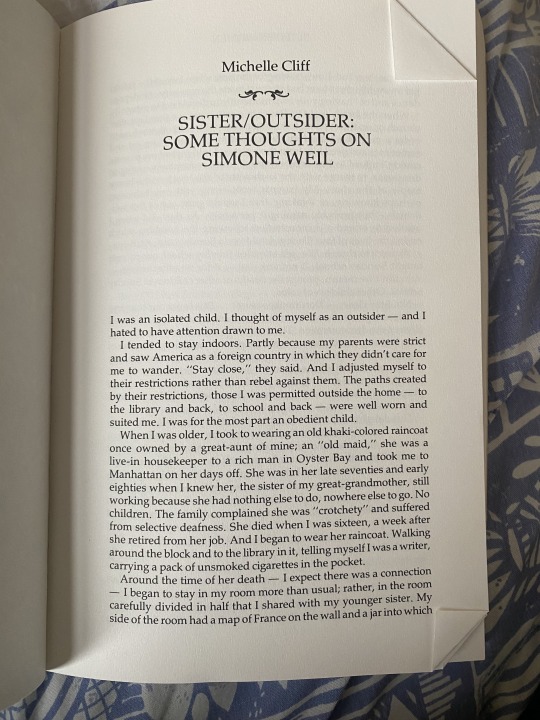
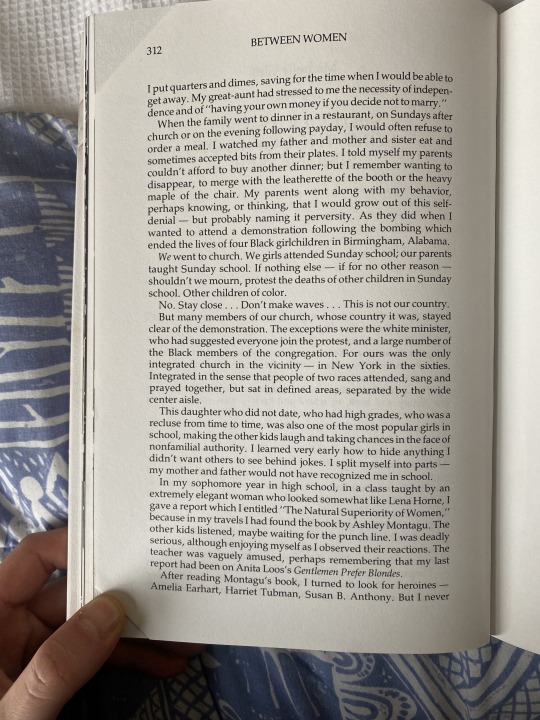








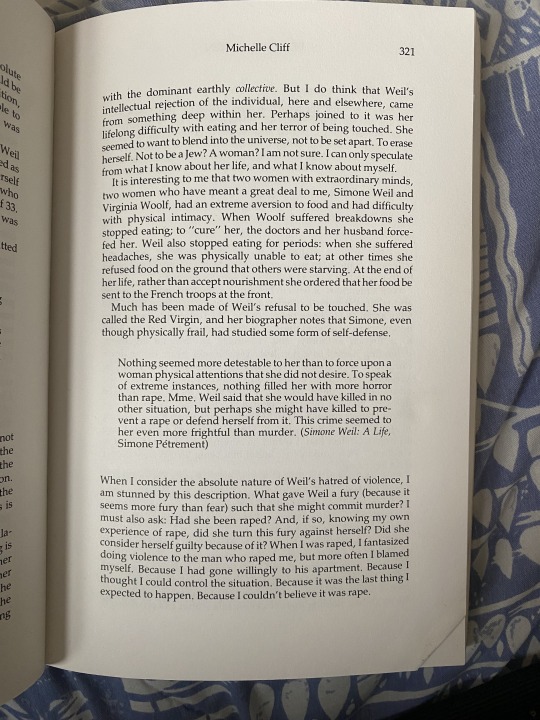

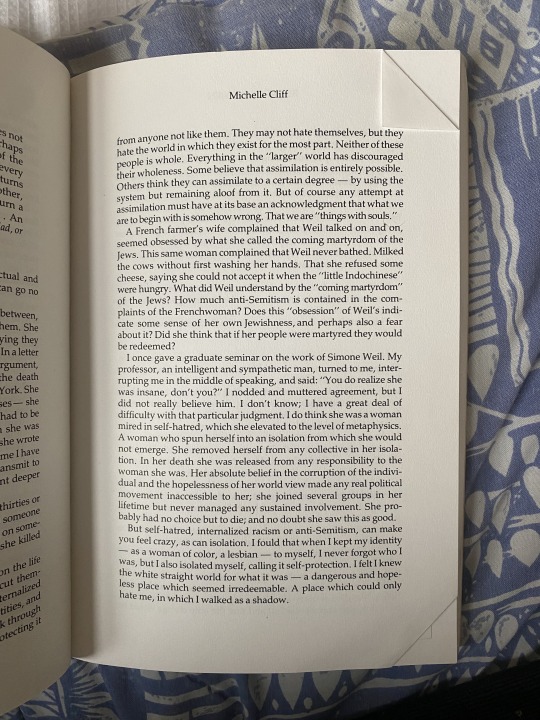
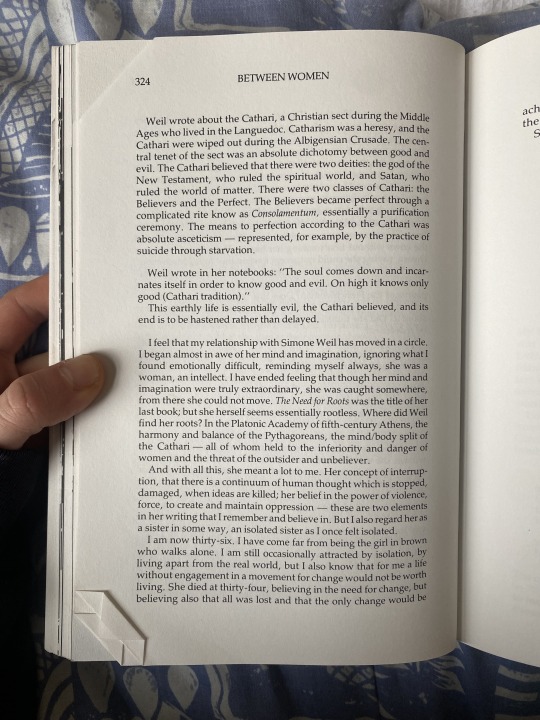
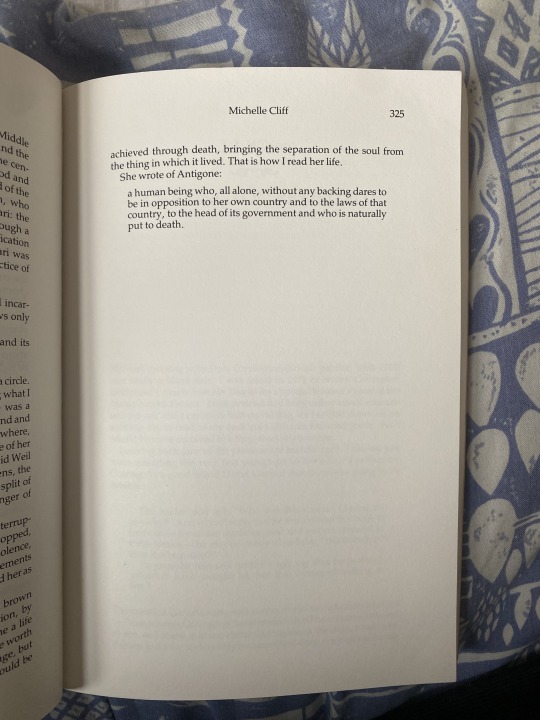
Sister/Outsider: Some thoughts on Simone Weil, Michelle Cliff
I found this essay in Between Women: Biographers, Novelists, Critics, Teachers, and Artists Write About Their Work on Women, edited by Carol Ascher, Louise DeSalvo, and Sara Ruddick, 1993 (originally published 1984).
I will return to this, but I'm just so grateful to read it. Cliff's experience, reflections, the insight about her seminar professor...
Separately, I attended a discussion on Weil last night which was so painful and shit - two male academics belittling her direct actions, her relationship to God, an obsession with describing her 'naivety'. It was so rank and absurd to watch these two berks infantilise a figure like Weil using a very, very thin sheet of scholarship over their misogyny.
Rant over, gratitude for Cliff's essay. Looking forward to reading the rest of the contributors.
#simone weil#michelle cliff#between women#american writing#queer theory#philosophy resource#to read#1990s#1980s#feminist writing#queer art#queer resource
5 notes
·
View notes
Text
A gangster, Nino, is in the Cash Money Brothers, making a million dollars every week selling crack. A cop, Scotty, discovers that the only way to infiltrate the gang is to become a dealer himself.
Credits: TheMovieDb.
Film Cast:
Nino Brown: Wesley Snipes
Scotty Appleton: Ice-T
Garald “Gee Money” Welles: Allen Payne
Pookie: Chris Rock
Stone: Mario Van Peebles
Selina: Michael Michele
Duh Duh Duh Man: Bill Nunn
Park: Russell Wong
Old Man: Bill Cobbs
Kareem Akbar: Christopher Williams
Nick Peretti: Judd Nelson
Keisha: Vanessa Williams
Uniqua: Tracy Camilla Johns
Frankie Needles: Anthony DeSando
Reverend Oates: Nick Ashford
Prosecuting Attorney Hawkins: Phyllis Yvonne Stickney
Police Commissioner: Thalmus Rasulala
Don Armeteo: John Aprea
Master of Ceremonies: Fab 5 Freddy
D.J.: Flavor Flav
Frazier: Clebert Ford
Prom Queen: Laverne Hart
Fat Smitty: Eek-A-Mouse
Biff: Gregg Smrz
Teacher: Erica McFarquhar
Singer at Wedding: Keith Sweat
Gigantor: Max Rabinowitz
Woman in Hallway: Marcella Lowery
Judge: Manuel E. Santiago
Prosecuting Attorney: Ben Gotlieb
Reporter: Thelma Louise Carter
Reporter: Linda Froehlich
Bailiff: Christopher Michael
Recovering Addict: Kelly Jo Minter
Recovering Addict: Tina Lifford
Recovering Addict: Erik Kilpatrick
Assistant DA: Ron Millkie
Kid on Stoop: Harold Baines
Kid on Stoop: Sekou Campbell
Kid on Stoop: Garvin Holder
New Year’s Eve Band – (Guy): Teddy Riley
New Year’s Eve Band – (Guy): Aaron Hall
New Year’s Eve Band – (Guy): Damion Hall
Singers – Spring – (Troop): Rodney Benford
Singers – Spring – (Troop): John Harrell
Singers – Winter – (Levert): Gerald Levert
Singers – Winter – (Levert): Sean Levert
Butchie The Doorman: Jimmy Cummings
Courtroom Spectator (uncredited): Akosua Busia
Prostitute in The Pool (uncredited): Lia Chang
Gangster Standing at Bar (uncredited): Jake LaMotta
Barber (uncredited): Larry M. Cherry
Brides Maid (uncredited): Cynthia Elane
Girl in the Window (uncredited): Toni Ann Johnson
Connie The Waitress (uncredited): Candece Tarpley
C.M.B. Member (uncredited): Chris Thornton
Film Crew:
Director: Mario Van Peebles
Story: Thomas Lee Wright
Music Supervisor: Doug McHenry
Screenplay: Barry Michael Cooper
Casting: Pat Golden
Production Design: Charles C. Bennett
Director of Photography: Francis Kenny
Casting: John McCabe
Editor: Steven Kemper
Unit Production Manager: Preston L. Holmes
Costume Design: Bernard Johnson
Original Music Composer: Michel Colombier
Music Supervisor: George Jackson
Associate Producer: Fab 5 Freddy
Associate Producer: Suzanne Broderick
Associate Producer: James Bigwood
First Assistant Director: Dwight Williams
Stunt Coordinator: Jery Hewitt
Stunts: Danny Aiello III
Stunts: G. A. Aguilar
Second Assistant Director: Joseph Ray
Production Supervisor: Brent Owens
First Assistant Editor: Kevin Stitt
Camera Operator: John Newby
First Assistant Camera: Gregory Irwin
Second Assistant Camera: Myra-Lee Cohen
Additional Camera: Ed Hershberger
Steadicam Operator: Ted Churchill
Production Sound Mixer: Frank Stettner
Boom Operator: Keith Gardner
Cableman: Rosa Howell-Thornhill
Art Direction: Barbra Matis
Art Direction: Laura Brock
Art Department Coordinator: Roberta J. Holinko
Set Decoration: Elaine O’Donnell
Script Supervisor: Cornelia ‘Nini’ Rogan
Makeup Artist: Diane Hammond
Assistant Makeup Artist: Ellie Winslow
Hairstylist: Larry M. Cherry
Hairstylist: Aaron F. Quarles
Wardrobe Supervisor: Barbara Hause
Wardrobe Supervisor: Jane E. Myers
Wardrobe Assistant: Jill E. Anderson
Gaffer: Charles Houston
Rigging Gaffer: Martin Andrews
Best Boy Electric: Val DeSalvo
Key Grip: Robert M. Andres
Best Boy Grip: Paul Wachter
Dolly Grip: Tom Kudlek
Property Master: Octavio Molina
Assistant Property Master: Laura Jean West
Assistant Property Master: Kevin Ladson
Charge Scenic Artist: Jeffrey L. Glave
Construction Coordinator: Raymond M. Samitz
Special Effects Supervisor: Steven Kirshoff
Special Effects Coordinator: Wilfred Caban
Second Unit Director: Jeff Lengyel
Second Unit Director of Photography: Jacek Laskus
Second Unit First Assistant D...
#cop#crack#drug dealer#drugs#gang leader#ghetto#heroin#new york city#street gang#Top Rated Movies#undercover agent
0 notes
Note
I just read a little book by Louise deSalvo (Adultery) and she reminds me so much of you! The synthesis of her teenage years and adulthood, especially.
Oh, interesting! I will definitely check it out. Thanks, anon!
1 note
·
View note
Photo



#(from Mitchell Leaska’s Introduction to The Letters of Vita Sackville-West to Virginia Woolf)#Virginia Woolf#Vita Sackville-West#The Letters of Vita Sackville-West to Virginia Woolf#Mitchell Leaska#Louise DeSalvo
332 notes
·
View notes
Text
I have searched far and wide (online) for any digital copies of ‘The letters of Vita Sackville-West and Virginia Woolf’ by Louise deSalvo and have had no luck in finding them. More importantly I have been looking for a physical copy of this book to see their letter exchange in all of it’s glory. If anyone could please let me know where I could find this I would be forever grateful.
19 notes
·
View notes
Quote
The purpose of her work, she [Djuna Barnes] said, was not revenge but justice - to right the wrongs done to her. She believed that unless we tell the stories of our traumas, we become members of the "living dead."
Louise DeSalvo, Writing as a Way of Healing
#louise desalvo#writing as a way of healing#djuna barnes#trauma#surviving#quotes#writing#justice#living dead#zombies#finding one's voice
1 note
·
View note
Photo

How to live with chronic illness (Jennifer Crystal, Psyche, July 20 2022)
“In her book Illness as Metaphor (1978), Susan Sontag says:
‘Everyone who is born holds dual citizenship, in the kingdom of the well and in the kingdom of the sick.
Although we all prefer to use the good passport, sooner or later each of us is obliged, at least for a spell, to identify ourselves as citizens of that other place.’
Some people only pass through the kingdom of the sick, like tourists, but others unwittingly take up permanent residence. (…)
If you live with a long-haul illness, perhaps you knew the pleasure of life on the other side before you got sick. Or maybe you were born with life-long illness.
I began in the kingdom of the well, took an unexpected trip to the kingdom of the sick at age 25, and have straddled the two worlds for almost two decades since.
Felled by a case of mononucleosis that slipped into chronic Epstein-Barr virus, I became bedridden, eventually discovering that I also had several underlying tick-borne infections.
I had to give up my job and my independence for the better part of three years. I battled my way to remission twice, through intense treatment and a shattering relapse. (…)
Ultimately, I learned that with my particular illnesses, there was no going back.
Instead, I needed to figure out how to move forward in the context of chronic illness.
Though I didn’t yet know the term – I’d learn it years later in graduate school – I’d been craving a ‘restitution narrative’, as the American author Louise DeSalvo called it in her book Writing as a Way of Healing (2000).
In this type of narrative, the narrator returns to a pre-illness state, eg: ‘I broke my arm; it healed; now I’m better.’
We love those types of stories but, try as we might, sometimes we can’t write them for ourselves; our bodies have other plans. (…)
When I stopped focusing on the word ‘back’, I reframed my thinking, and my way of being, so that my illnesses could come along with me. I learned not just to survive, not just to live, but to thrive.
What helped me achieve this shift? First, it was gaining a deeper understanding of my illnesses, their possibilities for relapse, and my role in controlling external factors that could affect those possibilities.”
14 notes
·
View notes
Text
[David Boyd] put a stroke on the canvas, then another, then another. And as he worked, he reflected on the process and said that when we begin a work of art, anything is possible. But that with each successive stroke, the possibilities become more limited, until, by the end—the most difficult stage—we have relatively few choices left because the universe of the work has been defined.
Louise DeSalvo (The Art of Slow Writing)
1 note
·
View note
Note
Hi! Hope you are well :) I'm a huge fan Steadfast Tin Soldier. It's genuinely one of the best fics I've read, and even now, I find myself rereading chapters for comfort. Your characterization and dialogue is *chefs kiss*, and the narrative flows brilliantly in a way that just makes sense. I was wondering, if you don't mind, if you had any writing tips, or if you could offer some insight on your writing process? I'd absolutely take a writing class from you tbh. Thanks <3
Wow, thank you for the kind words. Very glad the fic is enjoyable - and very sorry it is unfinished. I never had as strong grasp on the universe as I wanted to, and the more Blizzard added to their lore, the less interest I had on where they were taking things. (The subsequent news about ActiBlizz as a company didn't help, either.)
As far as writing tips go, I can offer up a few suggestions that I've picked up along the way, and a few book recs:
Writing Tools - Roy Peter Clark (this is my favorite book on writing, and covers a lot of the things that I try to keep in mind when writing)
The Art of Slow Writing - Louise DeSalvo (strategies and planning that may be useful in developing a writing process)
Boss Life: Surviving My Own Small Business - Paul Downs (not a book on writing, but seeing a year in the life of someone's hopes and dreams and fears all on the micro, day-to-day level is a really great way to study motivations and how many different ways a person can be impacted by the various events that happen in their world)
-----------
I would recommend a screenwriting class far above any others for any kind of fiction writing, for how it shifts the concept of writing out of the realm of trying to get emotions onto the page and into the more nuts-and-bolts strategies of "you have X number of pages and no more to introduce characters, love interests, rising action, etc." Having hard limits on the various elements of a story can help with focusing on getting the most impactful version of a moment out on the page.
-----------
In terms of flow, in a course once I was shown a long clip from the movie 'All About Eve,' where an older actress and a younger actress are in fierce career competition, and in the course of maybe five minutes the shift of who is winning and who is losing in the power struggle flips about five times.
In terms of a long story, having this continual tension and high-low tradeoff is a great way to keep things moving and keep the audience engaged and never sure what will happen next. If you have multiple character POV's, you can have some characters having a moment of triumph while others are Going Through It but it's a good idea to mix up the wins and losses. (Even in the overall descending arc of Jack and the fall of Overwatch, I tried to have a few moments of victory - like getting citizen status for Athena or a character moment with always-sunny Tracer - amidst the overall decline.)
-----------
That being said, the biggest difficulty I have as a writer is when I can feel something needs to happen in a story but I'm not sure how to make it happen organically - which is critical in maintaining the illusion these are characters with personalities and decisions that lead to cause-and-effect instead of just a plot leading them around to what I want to happen next.
As an example from STS - I knew I wanted Jack to break down briefly from the stress of everything so that later events with Athena could happen, but just having him crack for no particular reason wasn't very satisfying, and doing something like starting the scene with him already broken down also seemed a bit like cheating - although I will use that trick on occasion if it feels like getting the readers to a scene is much less interesting than what happens when they're there. I sketched out a couple versions of Jack having a bad day on a mission but it all felt like I was stuffing too much unnecessary filler into the scene.
I wish I could say I had some cool brainstorming trick or technique, but it just hit me out of the blue - Jack would have been counting the days, even if he wasn't admitting it to himself, even if it didn't make sense, from losing Amelie to Widowmaker showing up, and that date would be when he would have to admit to himself Ana was gone for good.
It was a pain to keep things on hold, but waiting around for the right detail made that scene a lot more specific and satisfying, I think.
---------------------
I've read a lot that says specificity, physical sense details and understatement are the best ways to handle big emotions. In a way, this kind of all ties back to 'show, don't tell' - you can tell me that a mother is still deeply grieving the loss of a daughter, or as in the exceptionally well written 'I have no choice but to keep looking', you can write that the mother makes a lunch for her lost daughter every day and takes it to the ocean, and I'll remember that detail for six years and counting (and probably forever).
--------------------
I’m hardly the first to say it, but reading and editing really are the two biggest skills as equally important as writing. Reading and studying how writers use various techniques as simple as writing shorter or longer sentences in a paragraph to impact the feel of a work will help with developing a writing style.
Also I edit aggressively. I usually edit as I'm going along, then within sections, then within the chapter as a whole - usually at least twice - and reading back on previous chapters to make sure things feel consistent and there's not too much repetition.
I'm trying to learn to let myself write crappier first drafts because figuring them out in the edit is easier.
I think that this is what that 'first million words' that gets mentioned a lot in writing really changed for me - the more I write, the less fragile what I'm writing seems to feel and the less afraid I am of moving around or adjusting or pulling out paragraphs to deconstruct and use elsewhere. Most everything of mine that looks like a smooth narrative in the version for public consumption goes through edit after edit after edit to get there.
-------
I hope that some of this was helpful, and thank you again! Keep writing!
11 notes
·
View notes
Quote
Through our reading we can travel to other times and other places, into other peoples minds and hearts and souls: it is a transcendent experience.
Louise DeSalvo, The Art of Slow Writing
413 notes
·
View notes